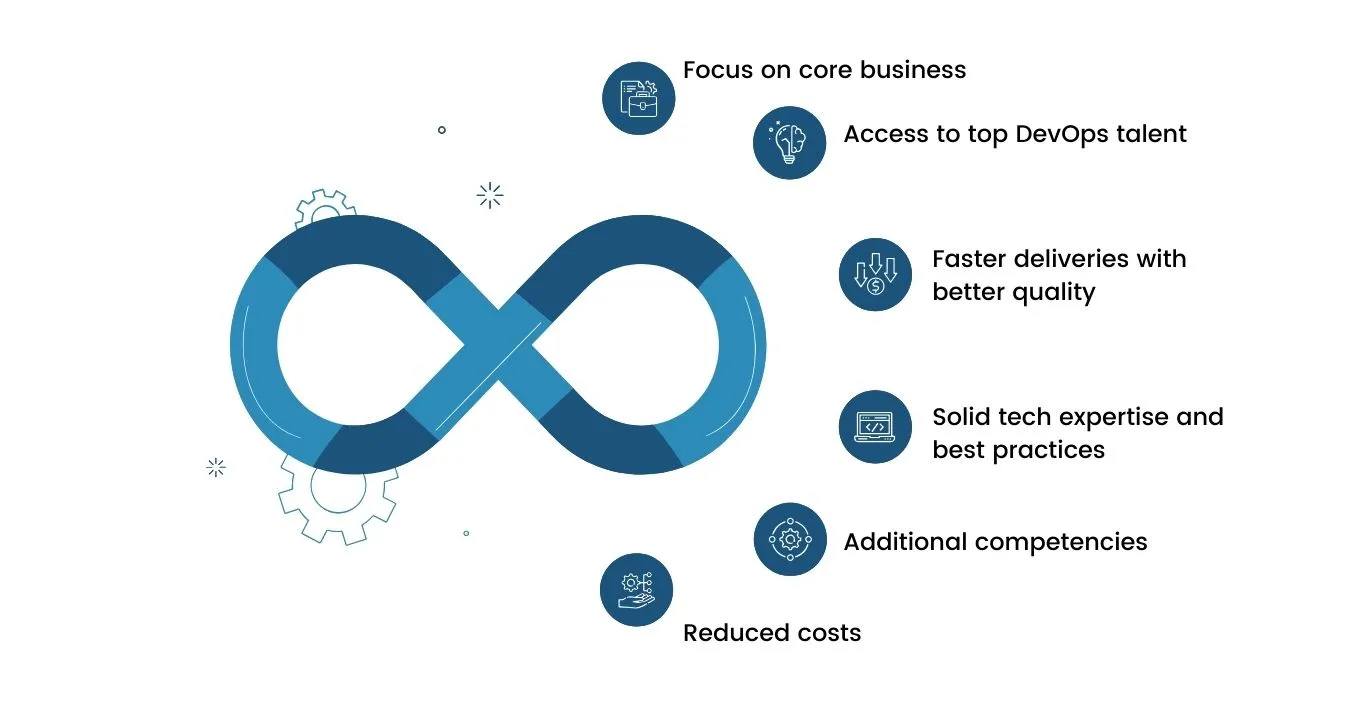The successful software development stories that stand out often involve a magic wand of sorts — DevOps. Picture this: a startup struggling to transform its elegant vision into a tangible, market-ready product. With the fast-paced soft dev world, getting from idea to execution isn't for the faint of heart.
Now, imagine an e-commerce startup that defies the odds. Let it be something like "SellingBuddy". In a matter of months, they went from being an underdog to a powerhouse in their niche. The secret sauce behind their meteoric rise? DevOps outsourcing.
DevOps is a term that's become synonymous with efficiency and innovation. At its core, DevOps is a culture and a set of practices that bridge the divide between development and operations teams. The result is a seamless pipeline that accelerates the software development process from code inception to deployment. And well, this approach has been gaining ground for several couple of years.
Yet, for startups, implementing an effective DevOps strategy is often akin to navigating a maze blindfolded. Chances are they encounter challenges such as limited resources, small teams, and the pressure to deliver high-quality product quickly. Startups can find themselves caught in a never-ending cycle of firefighting, struggling to keep up with the demands of a rapidly evolving market.
But here's the silver lining — DevOps outsourcing. Of course, it can’t be a magical pill that solves any problem. But just give the idea of outsourced DevOps a chance to show its advantages, and it’ll blow your mind.
The Challenges Startups Face in Implementing DevOps
Startups often find themselves up against a formidable foe: resource constraints. These constraints manifest in limited manpower, tight budgets, and a pressing need to deliver high-quality software swiftly. However, resource constraints need not be the shackles that impede progress. This topic deserves a separate article but let’s explore quick top four unconventional strategies to overcome these challenges.
Replace Manual Work, Remember to Use Matrix: Most startups can be compared to penny pinchers with their limited resources. They usually try to stretch investments and resources in general over as long a period of time as possible. So automate everything you can reach. Literally everything, from continuous integration and deployment (CI/CD) pipelines to infrastructure provisioning. Yet, the key is prioritization. Identify the most time-consuming and error-prone tasks in your development process and start there. Tools like the Eisenhower matrix will help you with this.
Less is More, Even in DevOps: Startups must be frugal when choosing the team size. That’s why it’s logical to consider a small, cross-functional DevOps team. Your new “crew” should have a deep understanding of both development and operations. Little team enables you to collaborate effectively and allows to get the most out of your limited resources. This is when less is more, literally.
Open-Source is Your Bread: As was said before, startup owners must seem like penny pinchers. And that’s okay as the open-source tools and community support is a treasure for them. Kubernetes, Jenkins, and Ansible are freely available and have a wide community that is willing to support and help.
Compare the salary of an in-house specialist and outsourcing costs
Outsource DevOps Tasks: If you don't have the in-house expertise or resources to implement DevOps effectively, consider outsourcing DevOps tasks to a qualified provider. Want to get a true narrow-specialized pro, then it’s better to outsource.
DevOps for Acceleration: Three Examples
Speed could be named as the salt of any startup: quick software delivery can make or break a venture. In this case, we can remind you about Need For Speed. But we don’t mean the computer game (are the olds here?) but rather the DevOps, with its automation, collaboration, and agility. Just take a glance at the following examples of how DevOps can accelerate development, reduce errors, and enhance collaboration.
Etsy: This well-known e-commerce platform is an embodiment of DevOps principles. Etsy implemented a robust continuous deployment process that enables them to release code dozens of times a day. By automating testing and deployment, they significantly reduced errors and improved the overall quality of their software. This speed and efficiency have contributed to Etsy's success in the competitive e-commerce space.
Spotify: The music streaming giant is renowned for its uncommon DevOps model. They've organized their development teams into autonomous "squads" that can make independent releases. This approach accelerates development as squads can iterate quickly without waiting for a centralized authority. It's a testament to how DevOps can foster collaboration and innovation within a single company. But there is a trust issue — without it, you are not able to build any outstanding system.
Slack: The communication platform that keeps teams connected has its own DevOps success story. Slack's focus on automation, monitoring, and collaboration allowed it to scale rapidly without compromising on the reliability of its service. This showcases how DevOps can empower startups to grow and innovate without fear of crippling technical debt.
These success stories reveal that DevOps is really similar to a magic wand for startups facing resource constraints. Strategic automation, specialized teams, and open-source tools are the best aids for startups in overcoming their limitations.
The Benefits of DevOps Outsourcing for Startups
As was mentioned above, startups often have “more tasks than they can chew”. This is where DevOps outsourcing comes into play. Can come, at least. Because before outsourcing DevOps, you should understand its difference from traditional outsourcing. Consider this in the example below.
DevOps Outsourcing: A Practical Example
Imagine a fitness startup, "Tech Revolution", that is on a mission to revolutionize the mobile app market with a groundbreaking app. The team is filled with brilliant minds who excel in app development but are relatively new to DevOps practices. Their innovation and creativity are matched only by their need for a streamlined, efficient DevOps pipeline. Enter DevOps outsourcing.
This is the strategic decision to partner with a specialized team or service provider to handle specific aspects of the DevOps process. This includes everything from setting up continuous integration and delivery (CI/CD) pipelines to managing infrastructure and ensuring continuous monitoring and improvement. It differs from traditional outsourcing in its specialization and focus on enhancing the software development lifecycle.
While traditional outsourcing often involves contracting general development or operational tasks to external teams, DevOps outsourcing homes in on the unique challenges of software delivery and infrastructure management. It's like hiring a surgical specialist for a specific medical condition rather than a general practitioner.
The Advantages of DevOps Outsourcing for Startups
Why you could do with DevOps contracting
Cost Savings: Probably the main one. But also the most arguable, because you can’t beat the odds all the time. However, a study by Forrester revealed interesting figures. According to it, businesses that adopt DevOps outsourcing save about 63% of their financial resources in three years. Should we mention that it’s paramount for any company that has just started its journey?
Access to Specialized Expertise: DevOps is a specialized field that demands a deep understanding of both development and operations. By outsourcing to experts, startups open doors to knowledge and experience that they may not have in-house.
Scalability: A mentioned startup's journey sometimes means rapid growth, which can strain in-house resources. DevOps contracting providers can scale their services according to the startup's needs. Potentially, this can lead to even faster growth as a startup doesn’t need to waste time managing infrastructure and other DevOps-related duties.
A Success Story of Tech Revolution
Returning to Tech Revolution, their success story epitomizes the benefits of DevOps outsourcing. Facing the challenge of efficient software delivery, they partnered with a DevOps outsourcing firm. This partnership allowed them to focus on their core competency: app development.
That firm implemented automated CI/CD pipelines, ensuring that every code change was rigorously tested and swiftly deployed. They managed the infrastructure, guaranteeing high availability and scalability while also continuously monitoring performance. This partnership enabled Tech Revolution to achieve remarkable growth.
A tale? Maybe, but we have a very similar real-life example of such a company. BetterMe, the most popular wellness app in the US AppStore, could teach startups how to grow exponentially by adapting wise outsourcing.
Key Considerations in DevOps Outsourcing for Startups
The success of the shift to DevOps hinges on critical considerations. Here, we delve into two crucial factors that can make or break your DevOps outsourcing journey.
Factor #1: Choosing the Right Outsourcing Partner
Let's say you're ready to consider outsourcing DevOps. This is where the nuances come into play. We don't want to sound salesy or pushy, so let's just list the key requirements for the partner. It doesn't matter who you order this service from, it's important that the partner meets these points.
Various Experience: When evaluating potential partners, experience takes center stage. Look for a provider with a proven track record in DevOps, ideally with experience working in your industry. This involves not only estimating the term of operation but also the specific tasks and challenges the partner overcame in the past. And the way it managed to do this.
Cultural Fit: Beyond technical expertise, cultural fit is paramount. Ensure your partner's values, work ethic, and approach to problem-solving align with your startup's culture. Recall the old fable where the animals pulled the buggy, each in their own direction. Something similar will happen in your situation if your partner's values are different from yours.
Effective Communication: Don’t fall for the technical jargon but rather check your partner’s ability to translate complex concepts into plain language. True professional stands out by their ability to explain complex ideas to eighth graders. Seamless communication bridges the gap between your team and the outsourcing partner, ensuring that everyone is on the same page.
Factor #2: Setting Clear Expectations and Performance Metrics
DevOps outsourcing is a collaborative venture, and like any partnership, it requires clarity from the outset. Definitely, you have your goals, so you need to meet them, right? It’s possible only if you set clear expectations and effective performance metrics.
Clear Expectations: Clearly define your expectations and objectives. What do you want to get at the end of the day? Whether it's faster release cycles, improved system reliability, or enhanced security, a shared understanding of your goals is essential. Document these expectations in a detailed service level agreement (SLA).
Well-Defined Goals: Each DevOps initiative should have well-defined goals, from reducing deployment times to enhancing system scalability. These goals should be SMART (Specific, Measurable, Achievable, Relevant, and Time-bound) to provide a clear roadmap for progress.
Effective Performance Metrics: It's impossible to gauge success without effective metrics such as deployment frequency, lead time for changes, and mean time to recovery. They offer insights into the effectiveness of your DevOps processes. Regularly track these metrics. For instance, high-class teams usually gauge lead times in hours, while teams that perform moderately or poorly measure lead times in days, weeks, or even months.
Guide on How to Implement DevOps Outsourcing Effectively
Step 1: Assess Your Startup's Needs and Goals
Obviously, you can’t arrive anywhere if you don’t know where you want to get. Start by taking a close look at your startup's needs and goals. Understand what you want to achieve with DevOps outsourcing.
Ask yourself questions like, "What are our pain points? Where do we struggle in our current development process?" Such self-reflection will help you identify areas where DevOps can become a game-changer. Ideally, you should make a document with the things you want to fix or improve in your software development journey.
Step 2: Research and Select a Suitable Outsourcing Partner
Let’s elaborate on the metaphor from the first step — you need a travel partner for your journey. That’s where some homework comes into play. Go to Clutch — here, you can estimate the partner’s tech proficiency. After narrowing down to 3-4 potential partners, open Glassdoor. Here, you can assess reviews and understand whether your values match. It's like finding a travel buddy who shares your interests and can help you navigate unfamiliar terrain.
Check the partner's experience, look at their past projects, and talk to their previous clients. Maybe this step requires double-down from you but rest assured — it’ll pay off.
Step 3: Develop a Clear and Detailed DevOps Strategy
It's time to create a roadmap for your DevOps journey. Think of it like a detailed itinerary for your road trip. Your strategy should include a step-by-step plan of how you'll integrate DevOps into your development process. That is, a detailed breakdown of which stage and specific task who is responsible for.
Specify the tools you'll use, the tasks you'll automate, and the changes you'll make. Just as you'd plan where you'll stop for meals and where you'll stay on your trip. This strategy acts as a guide, ensuring everyone knows what to do and where you're headed. The top tip — include small intermediate celebrations into your strategy. This will serve as additional motivation for your team and partner.
Step 4: Establish Effective Communication Channels
Communication is like the GPS of your journey — it keeps everyone on the same route. Create a Slack space, Microsoft Teams, or even Skype if this is a perfect match for your goals. Just ensure that there's a regular cadence for meetings and updates. This way, you can address any roadblocks or changes in direction quickly.
Step 5: Define Performance Metrics
During your journey, you need milemarkers to track your progress. Define performance metrics and benchmarks that show you're on the right path. This is like setting up signposts along your road trip route, telling you how far you've come.
Metrics could include things like how often you're deploying new features, how fast you can recover from failures, or how reliable your software is. This way, you'll know if you're getting closer to your destination and achieving the goals you set in Step 1.
To sum it up
The statistics can’t be ignored: 63% of organizations report cost savings through DevOps outsourcing. It's clear that startups will definitely benefit from DevOps outsourcing as they will save money, find access to specialized expertise, and obtain scalable solutions.
But don’t try to find a versatile contractor. Remember the comparison — choosing the right outsourcing partner is akin to selecting a travel companion. Your journey will be the most exciting if your travel partner knows the destination lock, stock, and barrel.
Devico has over 16 years of experience supporting top-notch companies worldwide. If you are ready to embark on your DevOps journey, let’s discuss the details.





